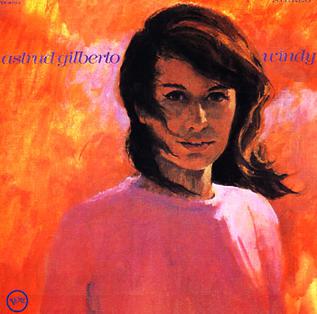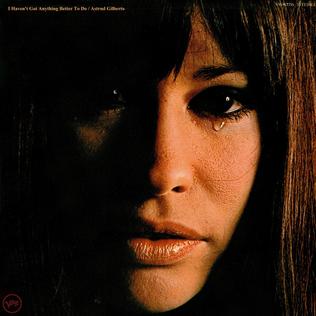
Antônio Carlos Brasileiro de Almeida Jobim, also known as Tom Jobim, was a Brazilian composer, pianist, guitarist, songwriter, arranger and singer. Considered one of the great exponents of Brazilian music, Jobim internationalized bossa nova and, with the help of important American artists, merged it with jazz in the 1960s to create a new sound with popular success. As such he is sometimes known as the "father of bossa nova".

Stanley William Turrentine was an American jazz tenor saxophonist. He began his career playing R&B for Earl Bostic and later soul jazz recording for the Blue Note label from 1960, touched on jazz fusion during a stint on CTI in the 1970s. He was described by critic Steve Huey as "renowned for his distinctively thick, rippling tone [and] earthy grounding in the blues." In the 1960s Turrentine was married to organist Shirley Scott, with whom he frequently recorded, and he was the younger brother of trumpeter Tommy Turrentine.

Getz/Gilberto is an album by American saxophonist Stan Getz and Brazilian guitarist João Gilberto, featuring pianist and composer Antônio Carlos Jobim, who also composed many of the tracks. It was released in March 1964 by Verve Records. The album features the vocals of Astrud Gilberto on two tracks, "Garota de Ipanema" and "Corcovado". The artwork was done by artist Olga Albizu. Getz/Gilberto is a jazz and bossa nova album and includes tracks such as "Desafinado", "Corcovado", and "Garota de Ipanema". The last received a Grammy Award for Record of the Year and started Astrud Gilberto's career. "Doralice" and "Para Machucar Meu Coração" strengthened Gilberto's and Jobim's respect for the tradition of pre-bossa nova samba.

Isabel Gilberto de Oliveira, known as Bebel Gilberto, is a American-born Brazilian popular singer often associated with bossa nova. She is the daughter of João Gilberto and singer Miúcha. Her uncle is singer/composer Chico Buarque.

Jazz Samba is a bossa nova album by Stan Getz and Charlie Byrd released by Verve Records in 1962. Jazz Samba signaled the beginning of the bossa nova craze in America. Stan Getz was the featured soloist and the tracks were arranged by Charlie Byrd, who had first heard bossa nova during a tour of Brazil in 1961.

Walter Wanderley was a Brazilian organist and pianist, best known for his lounge and bossa nova music and for his instrumental version of the song Summer Samba which became a worldwide hit.

The Deadly Affair is a 1967 British neo noir spy film based on John le Carré's first novel, Call for the Dead, published in 1961. The film stars James Mason and was directed by Sidney Lumet from a script by Paul Dehn.

Claus Ogerman was a German arranger, conductor, and composer best known for his work with Billie Holiday, Antonio Carlos Jobim, Frank Sinatra, Michael Brecker, and Diana Krall.
"Manhã de Carnaval" is a song by Brazilian composer Luiz Bonfá and lyricist Antônio Maria.

The Shadow of Your Smile is a studio album by Astrud Gilberto. With arrangements by Don Sebesky, Claus Ogerman, and João Donato, it was released via Verve Records in 1965. It peaked at number 66 on the Billboard 200 chart.

João Donato de Oliveira Neto is a Brazilian jazz and bossa nova pianist from Brazil. He first worked with Altamiro Carrilho and went on to perform with Antonio Carlos Jobim and Astrud Gilberto.

Jay Berliner is an American guitarist who has worked with Harry Belafonte, Ron Carter, Charles Mingus, and Van Morrison, among others.
Don Sebesky is an American arranger, jazz trombonist, and keyboardist.
Eugene Valentino Cherico was an American jazz double-bassist.

Astrud Gilberto is a Brazilian samba and bossa nova singer. She became popular in the 1960s after her performance of the song "The Girl from Ipanema".

The Astrud Gilberto Album is the debut studio album by Astrud Gilberto. With Antonio Carlos Jobim on guitar and the arrangements by Marty Paich, it was released via Verve Records in 1965. It peaked at number 41 on the Billboard 200 chart. In 2017, NPR placed it at number 73 on the "150 Greatest Albums Made by Women" list.
The discography of Astrud Gilberto consists of sixteen studio albums and two live albums on Verve Records, CTI Records, Perception Records, Audio Fidelity Records, Denon Records, Polygram Records, Pony Canyon and Magya Productions, as well as one music DVD on Coqueiro Verde Records.

Gilberto with Turrentine is an album by Brazilian samba and bossa nova singer Astrud Gilberto and American saxophonist Stanley Turrentine featuring performances recorded in 1971 released on the CTI label.

Windy is a 1968 studio album by Astrud Gilberto, arranged by Eumir Deodato, Don Sebesky, and Patrick Williams.

I Haven't Got Anything Better to Do is a studio album by Brazilian bossa nova singer Astrud Gilberto, released on Verve Records in 1969. In the liner notes Gilberto calls the album her "fireplace album".
















